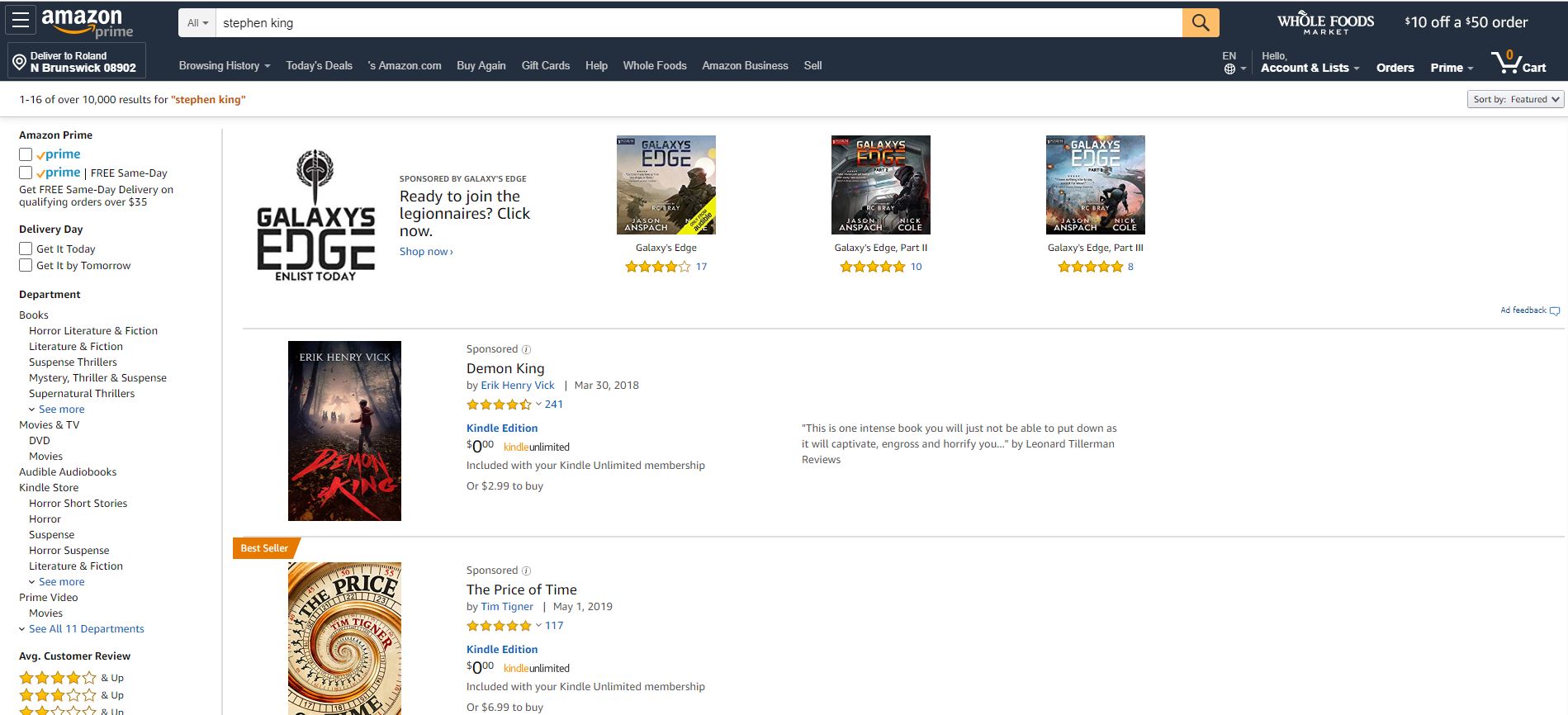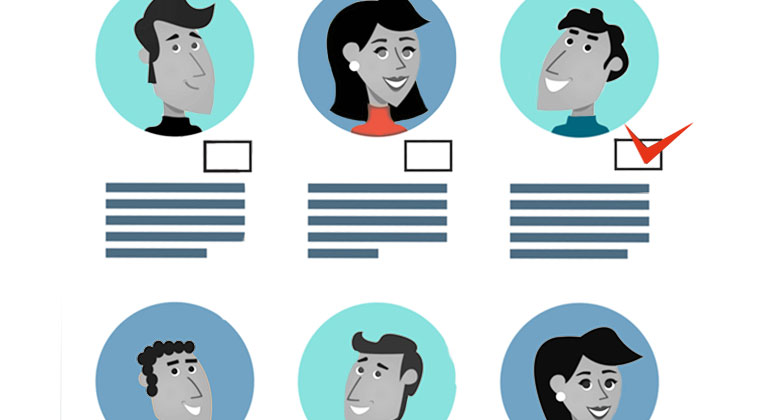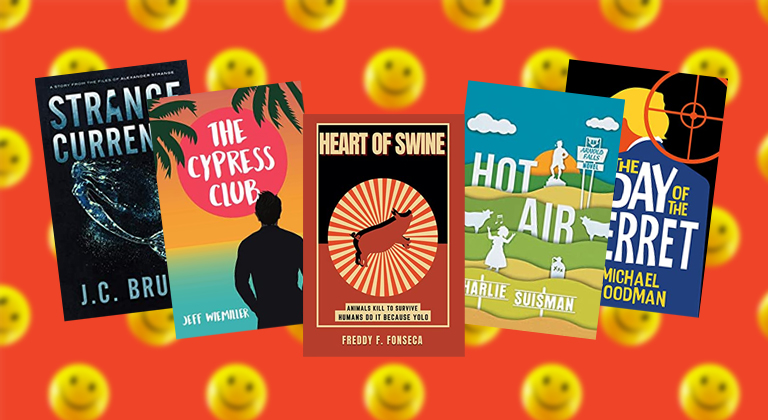Is Amazon taking Author Advertising too far?
Amazon has been experimenting with their ‘sponsored’ adverts for books – placing them in ever-more prevalent positions throughout a customer’s shopping experience. The question is – have they taken it too far, and have these Amazon advertising spots begun to negatively impact both the success of authors and the reader experience? Ginger gives his opinion on the issue. What do you think?
Recently, I was on Amazon organizing my catalog of books – and like I’ve done a thousand times, I typed my pen name into the search bar expecting to see all the books that come up related to it, independent of my Author Profile page.
What did I get instead? Two ‘Sponsored’ books, neither of which were mine.
My books were there – but ‘beneath the fold’. This means I actually had to scroll down before I’d even get to see any books relevant to the terms I’d put into the search bar.
At first, I wondered if that was just me – as a small-time author on Amazon, maybe my books were subject to a slightly more aggressive advertising presence.
But, no – I typed in ‘Stephen King’ and this is what I got back:

Astonishing, Stephen King – one of America’s most beloved and respected authors – has it even worse than I do! Not only are the top two results for the search term ‘Stephen King’ not books that he’d written, but a whole new line of advertising was thrown in for the ‘sponsored by Galaxy’s Edge’ content. Once again, you have to scroll down ‘below the fold’ to actually see any of his books.
Now, listen – I’m a free market capitalist as much as anybody, and I support Amazon strongly for everything they’ve given to independent authors…
…but this is ridiculous.
It’s ridiculous that you go to Amazon and search for an author’s name and they don’t give you books by that author – not without making you work for it by scrolling through their advertising. Not only is it a horrible user experience, it’s also impacting the success of authors.
I mean, I speak from personal experience with this – but I noticed a massive drop in my page reads and book sales in the middle of February this year – coincidentally, around the same time I’d really noticed the ‘Sponsored’ content ramping up. I’d had a pretty good and consistent run with my books, so I should have known how they would perform in terms of sales and Kindle Unlimited activity – and almost overnight they just stopped performing. Ever since then, my books have been getting better, my promotions tighter and my analytics even more granular; and it’s the same thing.
My only hypothesis? Amazon advertising has favored ‘Sponsored’ content to such a degree that now it’s negatively impacting an author’s ability to be seen on Amazon unless they are paying for that advertising themselves. In short, Amazon has become ‘pay to play.’
We really need somebody to dig down deep into the broader analytics of this, but to further back up my theory – when I stopped running AMS ads on two of my books… their sales disappeared.
Not slowed, but disappeared; like somebody turning off a faucet. I wasn’t spending very much – about $5 a day, per book – but I could see very clearly that without that spend, my books became invisible.
Now, I can understand why Amazon introduced their Amazon Marketing Services and I love the ability to purchase ads right on the Amazon shopping dashboard; but I feel there has to be a balance. Here are the reasons why I think this has gone too far:
- Readers aren’t being served relevant content. If somebody types ‘Stephen King’ into the search bar, you want Amazon to serve up links to Stephen King’s books – not books ‘like’ Stephen King’s novels. If that was the case, you could type in ‘horror’ or ‘thriller’ or even ‘books like Stephen King’s.’ If you type specific content into a search bar, you want that specific content delivered back to you – and the over-abundance of ‘Sponsored’ content now means that readers are having a much more difficult time finding the stuff they want to buy. Remember, you can pay to advertise your book with any author’s name as a keyword, even if your book isn’t remotely relevant to that author. So, somebody might type ‘Stephen King’ into the search bar and get served up three adverts for other ‘Sponsored’ books that could include Romance, YA, or any other genre. It doesn’t matter to Amazon. As long as that book’s advert uses Stephen King’s name as a keyword, and as long as the advertiser has the winning bid, that’s what people searching for ‘Stephen King’ will see.
- The content they are served isn’t guaranteed to be good. Likewise, one of the issues of Sponsored content is that practically any published book can be sponsored (with a few exceptions, like erotica) and there is no meaningful quality control in place. This is a problem because the world of independent and self-publishing is still the wild west, to a certain extent, and one of the ongoing issues is reader experience. Many self-published books are published unedited, and for a cash strapped author – knowing that his books aren’t going to be viewed without paying for the privilege – they might end up having to choose between paying for a good editor, or paying for advertising. As a result, not only will readers get served up less-than-relevant books, but there’s no guarantee those books will be good even if they click on them. In fact, the very setup discourages focusing on quality, which had been Amazon’s mission for years. Now it’s about spending the money to get your book seen.
- They’re turning Amazon into a ‘pay to play’ platform. One of the beautiful things about self-publishing on Amazon used to be that your books were featured alongside titles from the big ‘traditional publishers’, democratizing the whole process of publishing. As Amazon later focused more on shopper experience, this organically shifted to give preference to books with solid reviews and strong performance in the algorithm; which again was focused more on quality than advertising, and so provided a level playing field between self-published authors and traditional publishing, as long as those self-published authors were committed to quality. Now, however, that’s reversed – and the only way for your book to make a big splash is to pay Amazon money. This gives an unfair advantage to established authors and traditional publishers with a big marketing budget, and makes it even more difficult for new writers to ‘break into’ the industry. The sheer volume of ‘Sponsored’ content is basically eliminating everything that was once ideologically beautiful about the Kindle and self-publishing, and making Amazon just another curated platform to shift stuff people don’t really want.
There’s also a massive ripple to this shift, making other methods of marketing less effective. I’ve always been a huge proponent of leveraging the free promotional days that membership of KDP Select offers, and I pair each promotion with at least one newsletter service, so I can get my books downloaded as many times as possible. In the past, I’d buy a promotion and see my money returned within a day or so of it ending; as the thousands of downloads led to hundreds of sales and millions of pages read.
Recently, though, those same promotions deliver just as many free downloads… but not the sales and page reads afterward. Amazon has used ‘Sponsored’ content to obscure things like the ‘Also bought’ section to such a massive degree that the promotions that used to guarantee months of sales now barely make an impact; and newsletter sites that used to have a solid business model and deliver an excellent Return on Investment are really feeling the pinch.
As an author, I now feel that paying for Facebook and/or Amazon advertising – where you pay ‘per click’ – offers a better Return on Investment during a free promotion than a newsletter; and we’re seeing more and more newsletters go out of business as a result.
I mean, Amazon probably doesn’t care about third-party subscribers losing out on business – especially if those dollars end up going to them – but I personally feel for the businesses that developed to share free books with subscribers, and all those subscribers who used to get the opportunity to download free books through them.
Conclusion
Ultimately, it’s not that I’m opposed to Amazon advertising or ‘Sponsored’ content – in fact, I love it when it works for me! But it’s become too much. It’s starting to harm the publishing and shopping experience on Amazon, and I really think it needs to be dialed back.
I’m all for running a profitable business, but Amazon is a financial behemoth. They, more than anybody else, have the ability to focus on customer experience rather than revenue, and for years that’s just what they’ve promised. Well, I argue that ‘Sponsored’ content is hurting that commitment, and it’s really going to change the game if Amazon doesn’t step it back and focus once again on giving readers easy ways to discover the books they want to read, and authors a more consistent way in which to do that if they focus on quality rather than marketing.
What do YOU think? Sound off in the comments below!










